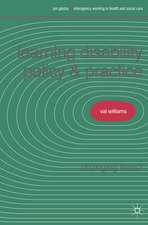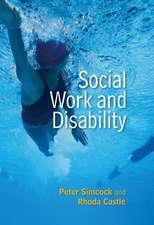Disability and New Media: Routledge Studies in New Media and Cyberculture
Autor Katie Ellis, Mike Kenten Limba Engleză Hardback – 20 dec 2010
Many of the studies on disability and the web have focused on the early web, prior to the development of social networking applications such as Facebook, YouTube and Second Life. This book discusses an array of such applications that have grown within and alongside Web 2.0, and analyzes how they both prevent and embrace the inclusion of people with disability.
| Toate formatele și edițiile | Preț | Express |
|---|---|---|
| Paperback (1) | 394.83 lei 6-8 săpt. | |
| Taylor & Francis – 29 ian 2013 | 394.83 lei 6-8 săpt. | |
| Hardback (1) | 1110.81 lei 6-8 săpt. | |
| Taylor & Francis – 20 dec 2010 | 1110.81 lei 6-8 săpt. |
Din seria Routledge Studies in New Media and Cyberculture
- 18%
 Preț: 703.51 lei
Preț: 703.51 lei -
 Preț: 364.22 lei
Preț: 364.22 lei - 9%
 Preț: 934.76 lei
Preț: 934.76 lei -
 Preț: 310.65 lei
Preț: 310.65 lei -
 Preț: 312.54 lei
Preț: 312.54 lei - 9%
 Preț: 937.47 lei
Preț: 937.47 lei - 30%
 Preț: 848.54 lei
Preț: 848.54 lei - 18%
 Preț: 1055.51 lei
Preț: 1055.51 lei - 18%
 Preț: 1008.17 lei
Preț: 1008.17 lei -
 Preț: 442.50 lei
Preț: 442.50 lei -
 Preț: 383.67 lei
Preț: 383.67 lei - 18%
 Preț: 1001.07 lei
Preț: 1001.07 lei - 17%
 Preț: 313.19 lei
Preț: 313.19 lei - 18%
 Preț: 1108.42 lei
Preț: 1108.42 lei -
 Preț: 451.76 lei
Preț: 451.76 lei - 49%
 Preț: 546.47 lei
Preț: 546.47 lei - 18%
 Preț: 998.71 lei
Preț: 998.71 lei - 26%
 Preț: 849.84 lei
Preț: 849.84 lei - 18%
 Preț: 1002.63 lei
Preț: 1002.63 lei - 18%
 Preț: 1111.58 lei
Preț: 1111.58 lei - 12%
 Preț: 318.90 lei
Preț: 318.90 lei -
 Preț: 370.35 lei
Preț: 370.35 lei - 18%
 Preț: 1063.65 lei
Preț: 1063.65 lei - 18%
 Preț: 696.82 lei
Preț: 696.82 lei - 26%
 Preț: 763.39 lei
Preț: 763.39 lei - 18%
 Preț: 1056.71 lei
Preț: 1056.71 lei -
 Preț: 384.81 lei
Preț: 384.81 lei - 30%
 Preț: 818.67 lei
Preț: 818.67 lei - 18%
 Preț: 1053.92 lei
Preț: 1053.92 lei - 18%
 Preț: 1059.28 lei
Preț: 1059.28 lei - 31%
 Preț: 766.26 lei
Preț: 766.26 lei - 18%
 Preț: 1059.84 lei
Preț: 1059.84 lei -
 Preț: 442.50 lei
Preț: 442.50 lei - 18%
 Preț: 1057.75 lei
Preț: 1057.75 lei - 18%
 Preț: 995.93 lei
Preț: 995.93 lei - 26%
 Preț: 822.01 lei
Preț: 822.01 lei - 18%
 Preț: 696.82 lei
Preț: 696.82 lei - 12%
 Preț: 305.71 lei
Preț: 305.71 lei - 18%
 Preț: 1106.02 lei
Preț: 1106.02 lei - 18%
 Preț: 1006.92 lei
Preț: 1006.92 lei
Preț: 1110.81 lei
Preț vechi: 1354.65 lei
-18% Nou
Puncte Express: 1666
Preț estimativ în valută:
212.55€ • 222.52$ • 175.87£
212.55€ • 222.52$ • 175.87£
Carte tipărită la comandă
Livrare economică 07-21 aprilie
Preluare comenzi: 021 569.72.76
Specificații
ISBN-13: 9780415871358
ISBN-10: 0415871352
Pagini: 184
Dimensiuni: 152 x 229 x 20 mm
Greutate: 0.5 kg
Ediția:1
Editura: Taylor & Francis
Colecția Routledge
Seria Routledge Studies in New Media and Cyberculture
Locul publicării:Oxford, United Kingdom
ISBN-10: 0415871352
Pagini: 184
Dimensiuni: 152 x 229 x 20 mm
Greutate: 0.5 kg
Ediția:1
Editura: Taylor & Francis
Colecția Routledge
Seria Routledge Studies in New Media and Cyberculture
Locul publicării:Oxford, United Kingdom
Public țintă
Postgraduate and UndergraduateCuprins
Introduction Part 1: At the Crossroads 1. Universal Design in a Digital World 2. iAccessbility from iTunes 1.0 to iPad 3. Building Digital Stairways: Nice View, But What About My Wheelchair? Part 2: How Did We Get Here? 4. We Want You in Our Network: Universal Design V Retrofitting the Web 5. (Physical) Disability is a Form of Social Oppression? 6. Does That Face-'Book' Come in Braille? Social Networking Sites and Disability Part 3: Where to Next? 7. Avatars with Wheelchairs, But No Virtual Guide Dogs: Disability and Second Life 8. Challenges and Opportunities: The Road Ahead for Disability in a Digital World. Conclusion
Descriere
Disability and New Media examines how digital design is triggering disability when it could be a solution. Video and animation now play a prominent role in the World Wide Web and new types of protocols have been developed to accommodate this increasing complexity. However, as this has happened, the potential for individual users to control how the content is displayed has been diminished. Accessibility choices are often portrayed as merely technical decisions but they are highly political and betray a disturbing trend of ableist assumption that serve to exclude people with disability. It has been argued that the Internet will not be fully accessible until disability is considered a cultural identity in the same way that class, gender and sexuality are. Kent and Ellis build on this notion using more recent Web 2.0 phenomena, social networking sites, virtual worlds and file sharing.
Many of the studies on disability and the web have focused on the early web, prior to the development of social networking applications such as Facebook, YouTube and Second Life. This book discusses an array of such applications that have grown within and alongside Web 2.0, and analyzes how they both prevent and embrace the inclusion of people with disability.
Many of the studies on disability and the web have focused on the early web, prior to the development of social networking applications such as Facebook, YouTube and Second Life. This book discusses an array of such applications that have grown within and alongside Web 2.0, and analyzes how they both prevent and embrace the inclusion of people with disability.














